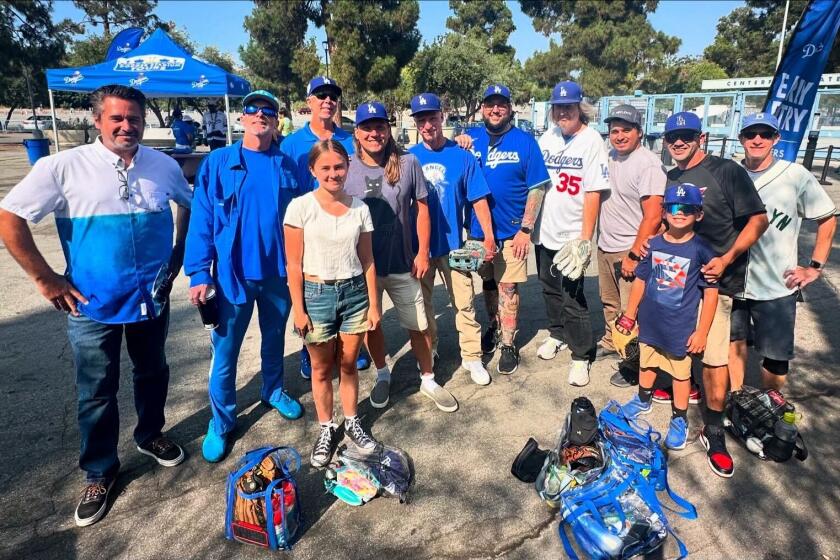Column: Frustrated Dodgers’ organist signals last notes, until team’s overture

Nancy Bea watches the game waiting for cues to play the organ during a Dodgers game no April 4, 2012.
Her music had been marginalized, her volume diminished, her Dodgers career slowly muted into irrelevance.
So Thursday morning, in responding to a question from a friend on her Facebook page about whether she was returning next season, a frustrated Nancy Bea Hefley answered simply, “ No ... I don’t fit in.”
The longest-tenured stadium musician in Los Angeles sports history confirmed that at the end of her 27th year as Dodgers organist, she would be unhappily walking away, a decision she later repeated after being contacted by The Times.
“I am retiring at the end of this season,” Hefley told The Times. “It’s finally gotten to me.”
Even her richest show tune wouldn’t be proper accompaniment for what happened next.
The Facebook exchange began spreading. Twitter talk began buzzing. Hints of outrage began forming. Dodgers officials who had not been previously informed of Hefley’s plans took notice.
Three hours after the original post appeared, one of those officials called Hefley and, soon thereafter, the woman who had been reduced to playing five minutes a day was suddenly un-retired after being promised a lifetime deal.
Anybody know the chords for, “Ya Got Trouble?” Or maybe it should just be, “Hallelujah.”
“I’m going to be staying with the Dodgers,” Hefley said in an interview after her phone call with team officials. “We talked things over, they told me I’m important to them.”
Indeed, despite slowly removing her from the game experience such that it seemed obvious she would not be re-signed after her three-year contract expired this fall, Dodgers management suddenly thought she was so important they gave her a job for life.
“They said I had a job as long as I want the job, the job would not be open for anybody else,” Hefley said. “I will be signing a new contract at the end of the year.”
They suddenly thought she was so important, they even asked her to immediately return to Facebook and post the good news, and so she did, writing, “To all my faithful fans, I WILL be coming back next year. Thank you for your support. The Dodgers have stated I have a job as long as I want.’’
Lon Rosen, the Dodgers’ marketing boss, confirmed the contract promise and the lifetime offer, which will come with a pay raise for next season.
“She’s always been a valuable part of the Dodgers,” said Rosen. Her retirement “was news to us, we spoke to her, we told her she was a valuable part of the Dodgers organization and the fan experience.”
Until now, their actions had not supported a belief in that value. In fact, Hefley has spent most of this season as a Dodgers afterthought, creating the frustration that led to her Facebook exchange.
“I’m not going to be badmouthing anybody, but I’m just tired of it. You get to the point where it’s just not worth it anymore,” she initially said Thursday morning.
Hefley said the final straw occurred during the last homestand when management stopped allowing her to play during the visiting team’s introductions, then ended the regular practice of showing her image on the big screen during her playing of “Take Me Out to the Ballgame.” Those changes, while small, are symbolic of the slow silencing that has occurred since Guggenheim Baseball Management purchased the team three seasons ago.
Hefley, whose Dodgers career began during the team’s last World Series championship season in 1988, estimated she once played 45 to 50 songs a night. Now she plays, at most, snippets of three or four songs. She once played virtually the entire game. Now she estimates she plays a total of five minutes.
During the Dodgers’ glory days, she became famous for serenading Orel Hershiser’s appearances with the song, “Master of the House,” from the musical “Les Miserables.” Today, she is not allowed to play when the pitchers come into the game.
During the Dodgers’ most glorious moment, she serenaded Kirk Gibson’s first-pumping home run trot with “Happy Days Are Here Again.” Today, when a Dodgers hit leaves the park, she keeps quiet.
“They don’t like my music, that’s what it comes down to,” she initially said. “I think it’s the style … they want more of the new stuff.”
After she un-retired, Hefley said more playing time was discussed, but not promised, something Rosen confirmed.
“The in-game experience keeps changing, continues to evolve, and Nancy’s role will still be there,’’ said Rosen.
In some ways, the Dodgers are in a tough spot with Hefley. Like all teams in a sport with an aging fan base, they are trying to attract a younger demographic, and thus are filling most of the game’s dead space with popular music ranging from rap to hip-hop to dance. As even Hefley would admit, there are times her classic favorites would slow the vibe, and she can’t easily change her tune. She acknowledged that a couple of years ago, officials requested she learn 20 newer songs, but she said they weren’t her style. The Dodgers’ taste seem to lean more toward the thump of Dieter Ruehle, the celebrated Kings organist, who was given more playing time when he filled in for Hefley last weekend.
Yet in another way, this should have been easy for the Dodgers. She’s Nancy Bea, for Pete’s sake. She’s beloved, she’s respected, she’s adored by Vin Scully, she still plays the heck out of Rodgers and Hammerstein, and why can’t you throw her a few more songs, a couple of more innings? There are few more trendy parks in baseball than the new Yankee Stadium, and yet organ music still fills the Bronx. There is still a small but valuable place in the modern baseball experience for “The Surrey With the Fringe on Top.’’ Why can’t the Dodgers find that place for Hefley and the many traditional fans who still love her?
And, just wondering, if Hefley is so important to them, shouldn’t the Dodgers have been in closer communication with her? At least close enough her frustration would never reach a level that she would publicly retire without telling them?
“I’m so humbled by all this,” said Hefley. “So overwhelmed.”
The Dodgers’ marketing people now know the feeling. Or at least they should.
Twitter: @billplaschke
More to Read
Are you a true-blue fan?
Get our Dodgers Dugout newsletter for insights, news and much more.
You may occasionally receive promotional content from the Los Angeles Times.









